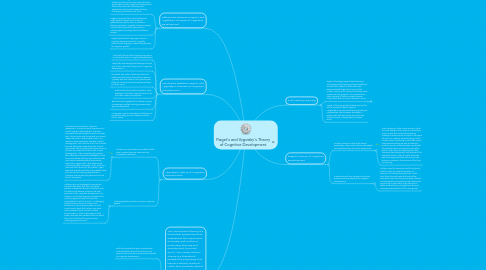
1. Differences between Piaget's and Vygotsky's Theories of Cognitive Development
1.1. Piaget believed that children's cognitive development is largely due to the result of their own efforts. Vygotsky believed that adults and other more advanced individuals would affect a child' cognitive development in that he/she would be mediating new experiences and provide support during challenging activities for the child.
1.2. Piaget recognized that cultural differences might have an impact, but he did not systematically explore them in children's thinking processes. Vygotsky, however, viewed culture as the paramount importance in molding specific thinking skills that children acquire.
1.3. Piaget believed that language enhances cognitive development while Vygotsky believed that language is absolutely essential for cognitive growth.
2. Similarities between Piaget's and Vygotsky's Theories of Cognitive Development
2.1. They both believe that acquiring language is an important factor in cognitive development
2.2. They both acknowledge that biological factors (e.g., brain maturation) play a role in cognitive development.
2.3. They both saw value in allowing children to make some discoveries themselves, however, Vygotsky also saw value in having adults pass along the discoveries of previous generations (Ormrod, 2014)
2.4. Both believe that children transform ideas, strategies, and other cognitive tools to suit their own needs and purposes.
2.5. Both theorists suggested that children acquire increasingly complex thinking processes with age and experience.
2.6. At any given point in development children are cognitively ready for some experiences but not for others.
3. Vygotsky's Theory of Cognitive Development
3.1. Children can accomplish more difficult tasks when assisted by more advanced and competent individuals.
3.1.1. Educators should conduct "dynamic assessment" in order to get a true sense of a child's cognitive development. The basic framework should be pretest, teach, and past test. When conducting the pretest, you should assess the child's current performance. For instance, when wanting to evaluate a child's reading level, have him/her read a list of words that are two grades lower than their current grade level. Once a child makes three errors on one list, then that will be the child's current reading level. After conducting the pretest, then help the child develop strategies to help them read words that they are unfamiliar with and how to understand what these words mean from a given text. After, observe the child and modify if necessary. Then, conduct a post test that is similar to the pretest. Again, start with a reading list that is two grades lower than the child's current grade level and compare and contrast this performance from that of the pretest.
3.2. Challenging tasks promote maximum cognitive growth
3.2.1. Children who are challenged, meaning are provided with tasks that they cannot yet perform independently but can perform with the help and guidance of others, will help promote his/her cognitive development. For instance, a child learning how to read should not be assigned a book that would be impossible for him/her to read. A challenging book that the child cannot read is not beneficial to their learning. Rather, a child should read a book that he/she may need some assistance from an adult in word pronunciation. As the child begins to read better, and with less assistance from an adult, then the child should be given a more challenging book to read.
4. The Sociocultural theory is a theoretical perspective that emphasizes the importance of society and culture in promoting learning and development (Ormrod, 2014). The Constructivism Theory is a theoretical perspective proposing that learners actively construct rather than passively absorb knowledge from their experiences (Ormrod, 2014).
4.1. Both the Sociocultural and Constructivism Theories believe the influence from one's physical and social environments are essential for cognitive development.
5. 21st Century Learning
5.1. Digital technology, project-based learning, and passion-driven learning allows students to do work that matters to them while also being assessed frequently to ensure that he/she is learning the concepts that they need to know as they progress. Also, students can attain mastery of these concepts however long it takes them to do so (Hampson, 2016).
5.1.1. Materials
5.1.2. Personel
5.1.3. Services
5.1.4. Duration
5.2. Usage of technology that students are familiar with is a powerful way to support independent, enquiry-based learning and peer collaboration, that increases standards of written work and also allows for instant and reflective forms of assessment (Hampson, 2016).
6. Piaget's Theory of Cognitive Development
6.1. Children construct rather than absorb knowledge. They construct their own beliefs and understandings from their experiences.
6.1.1. When teaching a child a new concept, rather than just telling him/her what it is, have them come up with the concept them-self by drawing on other similar concepts in the same scheme. For instance, when teaching a child to read, when introducing a new letter sound, have words that they are able to read first, and then words containing letter sounds that they already know, including the new letter sound. Then, show the child a picture that they would be familiar with that starts with the new letter sound. After, the child should be able to recognize that the first sound in the picture correlates to the new sound that they are learning.
6.2. Interactions with one's physical and social environments are essential for cognitive development.
6.2.1. Children need to experiment with the physical world in order for cognitive growth. For instance, for children learning how to read, have them play with sand and make letter formations. By conducting this activity, children not only become more familiar with letters and improve their motor skills, they also have a better understanding of weight and discover principles associated with force and gravity.
